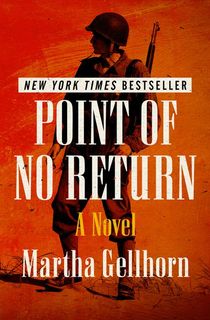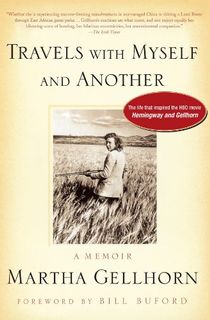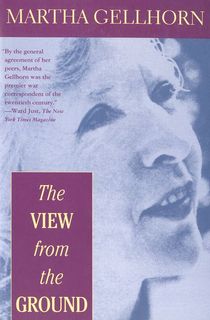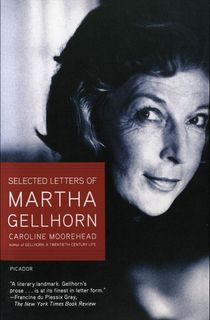She was not just Ernest Hemingway’s third wife. In fact, she very much resented that title, and her marriage to him fell apart for that very reason. Martha Gellhorn (1908-1998) was an American writer who carved for herself the distinction of being one of the most well-respected and in-demand war correspondents of World War Two.
Besides this dangerous work—extremely dangerous, and unconventional, especially for a woman—she wrote novels and extensive travel memoirs of her fast-paced, world-trotting lifestyle.
Her resume as a woman in the early twentieth-century journalism industry is outstanding. Besides writing articles for The New Republic, Collier’s Weekly, and Atlantic Monthly, she also at one point assisted First Lady Eleanor Roosevelt with writing correspondence and a thoughtful column in Women’s Home Companion, a widely read monthly magazine.
Gellhorn broke the barrier built against female journalists that attempted to restrict them to just writing about gossip, housework, cookery, and fashion. Fierce, talented, and spirited, nothing got in the way of her successful career and productivity—not even a needy, pushy, and inconvenient husband.
Martha Gellhorn & Ernest Hemingway
Ernest Hemingway may have been a master modernist writer, but on the marriage front, he was an utter failure and by no means modern. By the time he married Gellhorn in 1940 he had botched two marriages already and hadn’t learned a thing about how to treat a female partner correctly.
The bane of their relationship was his whining about her frequent work absences, allowing his misogyny to override any respect for her as a fellow writer with professional commitments. When she left him alone temporarily in 1943 on an assignment at the Italian front, he sent her a letter that may have seemed like a reasonable complaint in his time, but comes across as emotionally manipulative and pathetic in ours: “Are you a war correspondent, or wife in my bed?"
In general, they were a bad match. Gellhorn rebelled against Hemingway’s possessiveness and had a love affair with another man, while Hemingway felt threatened by not being the only writer in the relationship. She couldn’t handle the scope of his shadow, and he couldn’t handle the competition.
F. Scott Fitzgerald and Zelda Fitzgerald’s marriage broke down for the very same reason. Fitzgerald was also not prepared for his wife to branch out on her own as a writer. Perhaps, sadly, this was a curse of the century and the times. Gellhorn and Hemingway’s marriage lasted only four years and by 1945 they had parted ways for good.
Readers who are curious about how Gellhorn fared as a creative following her split from her famous husband have a rich selection of her works to choose from. Gellhorn had a style of her own, one well-suited to war reporting, novel writing, and travelogues: attentive, passionate about her craft, hotly honest, and undeterredly to-the-point. Here is a list of five of her books that are certain to make readers view her as much more than just “the third wife.”
Martha Gellhorn Books

A Stricken Field
“She tried, leaning back and closing her eyes, to put in order what she had seen, heard, and what she had known before. She wanted to place her knowledge in paragraphs (a good opening sentence? she thought), so that it would be easy to handle when she came to write it. But it did not fit in paragraphs and she could not see it, plain and informative, colourful but unimpassioned, on a page. There was no beginning, no middle, no end.”
Gellhorn had the makings of a historian, but rather than produce stale history textbooks, she combined her accumulated knowledge of politics and patterns of human behavior with her gift for storytelling in a hybrid book that records the state of the country of Prague (formerly Czechoslovakia) following its occupation by Nazi Germany and its annexation.
The storyline follows a determined journalist, Gellhorn’s self-insert, who travels to the country to essentially help pick up the debris of its violent battering by the enemy. The protagonist devotes herself to assisting displaced war refugees and making sure that her account of events is an unobstructed, unbiased one, so that future generations will know exactly what atrocities occurred in what was meant to be a free democratic nation.

Point of No Return
“What gave these krauts a right to say who should be born and who shouldn't, and who could live and be let alone, and who would get caught and killed?”
Ernest Hemingway wrote For Whom the Bell Tolls, and Gellhorn wrote Point of No Return. Which author better captured the experiences of a young soldier whose innocence is ravaged by war is up to each reader’s taste and interpretation.
Gellhorn’s champion in the ring is Jacob Levy, a St. Louis native who lived in a state of blissful ignorance and disinterest in the world before he enlisted in the American army. That untouched psychological state changes fast as the novel carries him through WWII’s battles, the pushback of the Allies against Nazi Germany, and the horrific uncovering of the extermination death camps, all of which ultimately drive Levy to take extreme action in retaliation.
Like A Stricken Field, this novel is bedded in harsh truths, and based on many of the traumatic events that Gellhorn personally witnessed in her lifetime.

Travels with Myself and Another: A Memoir
“I felt both puny and pretentious, trying to write in the grandeur of that natural world where everything was older than time and I was the briefest object in the landscape.”
Gellhorn’s research for her work had her practically racing across the globe nonstop, so at least one travelogue by her was unquestionably in order. Her experiences as a traveler were unique and unmatchable. What she produced is by no means a gentle travel memoir. There is very little time for wandering around art museums and having quiet revelations or sitting with a drink and admiring the mountains in the distance. Gellhorn was far too busy for that.
Travels with Myself and Another offers readers an account of a pot-boiling week she spent in the company of political rebels while stationed in Moscow. She also holed herself up with a group of hippies in a water tank in Eilat, Israel, and galloped by horseback through China during the Sino-Japanese War. Hemingway makes appearances in Gellhorn’s adventures but is mostly regarded as Gellhorn’s sidekick. He is just the “another.” A small tidbit of revenge for “the third wife.”

The View from the Ground
“What was new to our ears these days, and thrilling to hear, was the steadiness and justice of those who spoke, the absence of panic and exaggeration the quiet insistence on legal processes as opposed to trial by suspicion. McCarthyism so repelled the English that they take special care not to be infected by it.”
Gellhorn was working as a journalist during perhaps one of history’s most turbulent blocks of decades, and she had something to say on everything. The View From the Ground is presented as an assembled collection of articles and essays, showcasing Gellhorn’s honed opinions on everything from lynchings in the American South to Cuba’s precarious political climate back when Americans were still permitted to visit the country.
The pieces are arranged in chronological order for readers’ convenience, and Gellhorn’s reporting on the McCarthy witch trials, the Eichmann trials, the Vietnam War, and the 1984 minors’ strike in the United Kingdom can all be easily accessed in the exact order that they happened.

Selected Letters of Martha Gellhorn
“It is much harder to be lonely, when you have for a while stopped being lonely. I was used to having only myself, cold and hard as that is; I could live with it. And now I wait, for a voice, a face, a body, that is not going to be here, is not mine, does not in any case wait as I do, nor share this homesickness. […] How to explain that I taught myself to be tough and indifferent, because it mattered too much and learned not even to weep in my mind not to notice.”
Gellhorn lived a life constantly on the move, and so naturally her skills as a letter-writer were constantly put to use. She never stopped reporting on what she saw, even in her private correspondence. Gellhorn’s biographer Caroline Moorehead edited this extensive volume after seeking permission to access the letters but gave first priority to keeping Gellhorn’s booming voice intact. Readers will enjoy the privilege of following the chronicles of Gellhorn’s close friendships with other literary icons of the twentieth century along with the notorious four-year marriage with Hemingway doomed to collapse like a fragile structure. What is rock-solid, though, is Gellhorn’s unrelenting way with words, in any form.

